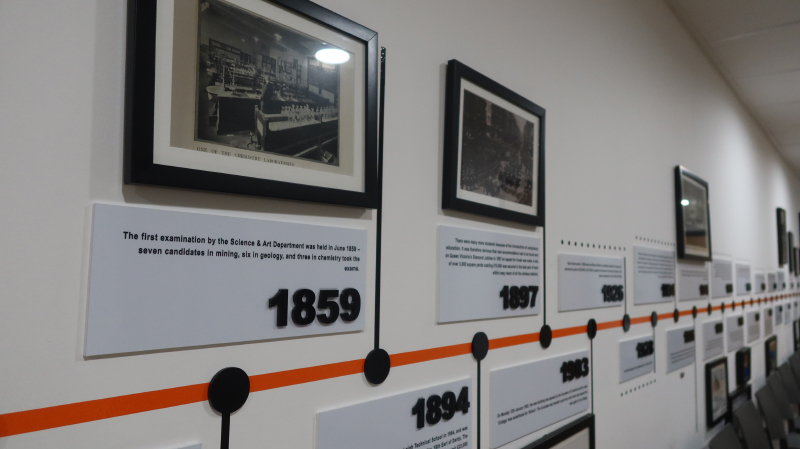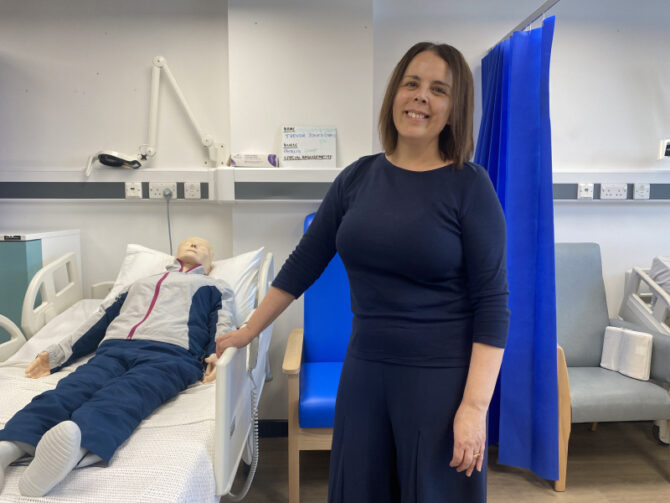Wigan & Leigh college principal Anna Dawe demonstrates how collaboration is power if regions are to fully harness the opportunities offered by devolution
Much of Anna Dawe’s further education career has been “coloured” by the idea that colleges compete against each other in a “highly competitive market”.
Years ago, she recalls colleges paying for adverts on the back of buses and around towns that boasted their achievement rate topped those of rivals.
But not these days.
She has just come off a call “chewing the cud” with eight fellow Greater Manchester principals. Dawe, chair of the group, describes their relationship as “supportive” and credits devolution for their “distinctly increased levels of collaboration”.
That wasn’t the case when she joined Wigan & Leigh College a decade ago. At the time, Greater Manchester was going through an area-review process, with the combined authority at loggerheads with colleges over merger proposals.

Wigan & Leigh was once a mining college. Dawe proudly shows me a painting displayed in the reception of the college’s main building of local pit brow lasses.
The college’s motto, “So out of darkness comes light”, reflects the image, and also Dawe’s own career path, during which she has helped lead successive colleges out of their darkest times.
Life in HE
She has done so with a willingness to buck national trends to meet community needs – doubling 16-to-18 apprenticeships provision at a time when others were pulling back, and currently fully embracing T Levels.
Dawe’s collaborative ethos extends to schools and HE partners too. Her college runs a 14-to-16 programme to get elective home educated teenagers re-familiarised with mainstream education, and she sits on the University of Manchester’s governing board.
I didn’t appreciate the skills required of a governor
Seeing things from the “other side of the fence” as a board member is hugely revealing, she says.
“Until I’d walked in the shoes of a governor, I didn’t have a full appreciation of the skills required. And you don’t know HE as well as you think until you’re there. It wakes you up that you’ve still so much learning to bring back to your own leadership.”

Dawe chose to carve her career as a young law lecturer in FE rather than HE.
After studying law at the University of Central Lancashire in Preston, half an hour up the road from her hometown of Blackpool, she took a law master’s at Sheffield University “to put off making the decision about becoming a solicitor”.
Aged 22, she started teaching law at her university and GCSE law at Sheffield College. She preferred the FE classes.
“I’d come out of those classes with a real buzz,” she recalls. “You could see those learners grow in confidence and stature over the year.”
After beginning a PHD but growing “tired of academic work”, she opted to teach full-time at Calderdale College in Halifax, West Yorks.
Dawe was living in Merseyside with her two young children when she accepted a head of department role at Tameside College. Aged 32, in 2003, she became an assistant principal. She moved to Riverside College five years later to be closer to home.
Riverside had formed from a merger of Halton College and Widnes and Runcorn Sixth Form College two years earlier, so it had never been inspected. Seven months after she arrived, Ofsted rated it grade four.
“It was devastating to see the impact it had on colleagues,” Dawe says.

Darkest days
But the verdict was a catalyst for change. Mike Sheehan was brought in from grade one-Runshaw College in Leyland, Lancs, and what Dawe learned from him shaped her as a leader.
These were her “darkest days” and Dawe put “everything I could” into Riverside. But curiously, after the college had progressed on its turnaround journey (it was rated grade two in 2010, and again in 2015), she admits “boredom” set in.
“You spend years wanting a peaceful life, wanting the college to get where it should, and then you go, ‘is that it?’,” she says.
Relishing the prospect of a “new roller-coaster ride”, Dawe followed Sheehan to Wigan & Leigh College which had “fallen on hard times” in terms of finances and quality.
Ofsted inspectors arrived during her first week and bumped it from grade two to three. Dawe was “quite pleased” with the judgement which “could have been worse”.
She credits Sheehan for the “heavy lifting” needed for significant change. But after he decided to move on, it was not an obvious choice for her to step into his shoes.
Dawe “loved that closeness to the students” she gained from being involved in curriculum development as an assistant and then vice principal, and worried she would become bored as principal.
But she did not relish the prospect of a stranger stepping in and potentially derailing their improvement plans.
So the decision was made, and after working a stint as interim leader she applied for the post and “never looked back”.
Wigan & Leigh was given a grade two in 2016 which was a “good springboard for staff to know we were on the right trajectory”. More importantly for Dawe, the improvement was recognised by the local community.
The college had been “losing learners it should have had”, but as it “found its place again and began to do what it should be doing, they came back to their local college”.
Wigan & Leigh has since doubled its student numbers (to 4,100) and turnover from £25 million to £50 million.

Apprenticeship growth
The college appeals to Dawe because it is “general FE in its richest sense”, providing 16 to 18, adult education, apprenticeships and higher education. She says she was determined to ensure that despite its financial challenges, the college should “sustain that breadth of work”.
That meant continuing to provide apprenticeships when they were judged ‘requires improvement’ while the rest of the college was graded ‘good’.
While common sense was telling her to close the apprenticeships division, which “would have been easier to maintain a healthy Ofsted grade”, she also knew “this borough thrives on apprenticeships”.
Dawe tells me apprenticeships were “almost seen as a side part of the college and not central” to it, but says: “It doesn’t matter whether 16 to 18 is the bulk of your funding. Every single learner is as important as the others.”
Wigan & Leigh initially shrank its 2,000 strong apprenticeships offer to focus on quality, then rebuilt it to 2,500 apprentices, increasing income from the schemes from £4.6 million in 2016 to £8.7 million this year. Its age 16 to 18 cohort has grown 47 per cent since 2021 during a period of decline nationally.
Wigan also bucks the trend for NEET (not in education, employment or training) numbers; the NEET ratio was 7 per cent in November for Wigan, compared to 10 per cent regionally and around 13 per cent nationally.
Dawe believes NEET trajectories would have been worse had BTECs not been given a defunding reprieve.
A loss of Wigan & Leigh’s BTEC in health and social care would have “halved the numbers overnight” of prospective health and social care workers “at a time when the NHS workforce plan requires them”, she says.

T Level trouble
Dawe ushers me into a health T Level workshop, where a row of mannequin ‘patients’ lie in hospital beds with seemingly anguished expressions. She grimaces, “convinced” that “one day, one of them will get up and walk to my office, like something from Doctor Who”.
The principal is a fan of T Levels, which have been “highly successful” at Wigan & Leigh; over 200 students are taking them. But she believes they are over-assessed compared to A-levels, “in some cases, asking for far too much”.
If a young person fails one A-level, they typically still “walk out” with two others, whereas with T Levels, “if you fail any part over two years, you fail the whole qualification”, she says.
In 2023-24 only 0.2 per cent of T Level entrants got the highest grade (distinction*). If that percentage of young people got A*s in A-levels, Dawe believes “there’d be a national outcry”.
She “fed this back” through government channels but was told “there has to be rigour” in T Levels. She retorts that as an educationalist, she is “all for rigour”, but “there’s a point at which you have to be pragmatic”.
Dawe sees T Levels as “the technical level three pathway” but over-assessment is “making it harder for young people who sometimes don’t have maths and English, and that was their pathway”.
She adds: “It’s taken the pathway from the very kids that level three technical education was meant for, and reshaped it into another pathway for someone who can do A-levels.”
Dawe would like to see “tweaks and changes” made to the qualification rather than a full-scale overhaul, and despairs that when a new curriculum is introduced in FE, it is not properly impact assessed.
“We tend to kind of just throw the baby out with the bathwater and bring something new in – it’s very difficult to keep a curriculum updated when the [structure] is permanently changing,” she says.

Collaboration applauded
Dawe tells me the combined authority has worked with the college to secure T Level work placements from employers, which is an onerous task due to their duration.
For the first time in her FE career she is hearing a politician (mayor Andy Burnham) “stand up” and say that “technical education is as important [as academic]”.
And Dawe is proud that Wigan & Leigh got a mention in the recent devolution white paper, for its work with the combined authority and Kraft Heinz in applying “flexed AEB funding” to “address a productivity-limiting skills gap”.
The white paper says Greater Manchester identified AEB eligibility for 17,000 more residents enrolling on over 28,000 learning aims that “wouldn’t have been accessible under national eligibility”. Dawe credits devolution for enabling Wigan & Leigh to do “much more bespoke employer work”.
But it hasn’t all been plain sailing with the combined authority. Initially, discussions “presented quite a lot of challenges” because the college was used to seeing the AEB as its own – a case of “I’ll use it how I want, thank you”.
Devolution means the college can be “more creative” with AEB funding. Dawe and her fellow Greater Manchester principals “sit and talk” about how they are spending it, which never happened previously.

Burnham’s single pot
But there are plenty more changes in the pipeline.
Dawe says Wigan & Leigh will “absolutely” benefit from Burnham’s Greater Manchester Baccalaureate, or MBacc, offering school pupils a suite of technical subjects to better prepare them for FE and the workforce.
And Burnham will soon get his hands on a single consolidated budget, giving him the power to channel AEB funding into potentially vote-winning transport projects if he chooses.
Although Dawe does not see this as a threat, she does “worry” that much of the dialogue from Greater Manchester around skills is centred around 16 to 18 initiatives rather than adult education, which “just can’t take any more cuts”.
“It’s a great shame, because the value in FE is all its component parts,” she adds. “We focus on what seems to be the flavour of the day, and that’s never changed.”









Your thoughts